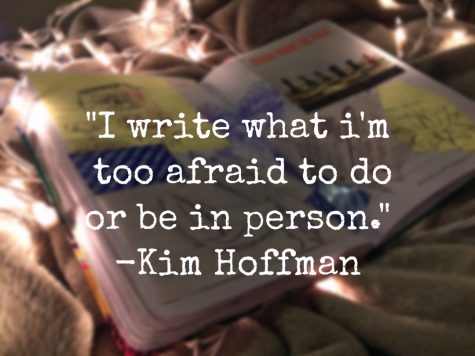Jot Daily: The power of alleviating anxiety through journaling
Thoughts constantly fly around our head, aimlessly looking for a place to stay. Keeping a journal provides a safe, private, and expressive outlet for these thoughts to live. “In a journal, I can literally do whatever I want. I can scratch stuff out or rip the pages. I’m free to completely express myself, my emotions, and my art. I love it so much,” Kim Hoffman said.
December 19, 2017
According to the Anxiety and Depression Association of America, 25.1% of teens from the ages of 13-18 suffer with a variation of an anxiety disorder in the U.S. Due to numerous physical, emotional, and mental changes occurring during teen years, anxiety proves normal in teens, but when ignored, the effects become prolonged. Journaling provides an outlet for emotions instead of suppressing them, which later leads to mental illness.
The little attention paid to seemingly normal symptoms later increases the chances of long term anxiety and depression. Despite the large availability of medicine and treatments, about 80% of teens diagnosed with anxiety and 60% of teens with depression fail to receive treatment.
Lack of financial ability to seek out treatments, failure to accept disease, and fear of judgment all contribute to helping this overly common problem. When faced with emotional turmoil as individuals, teens in particular feel isolated, as if nobody holds the solutions to these problems. Journaling introduces a private form of therapy completely dependent on the individual’s ability to explore their feelings, introducing privacy while providing a greater understanding.
Voicing inner thoughts and dilemmas seems frightening to those dealing with internal problems, due to the negative stigma around mental disease that instills fear in those who need help. Along with the angst of social prejudice, economic struggles play a large part in the failure to search for professional aid because therapeutic aid proves costly. Journaling provides a low cost alternative to professional therapy methods and medicines.
Along with fear and economic ability, the antidepressants used to treat mental illness result in unpleasant side effects, which leads to avoidance of treatments. These side effects include severe nausea, insomnia, dry mouth, weight gain, and blurred vision. Despite the large availability of non-medicinal treatments and therapies, they unfortunately come with a costly price tag, diverting customers who need help.
Those dealing with mental illness and intense emotions attempt to suppress their thoughts leading to a lack of productivity, and social engagement, impairing physical and mental health. Individuals living with an undiagnosed mental disease or simply those going through a rough time lack knowledge of the importance of giving their emotions a voice.
People should not suppress their emotions because they play a crucial role in our survival. Experiencing and voicing a full range of emotions increases health and happiness. Vocal expression does not serve as the only method of voicing one’s emotions; likewise, creative expressions such as journaling provide a more private outlet for individual therapy.
“It’s unhealthy to suppress your emotions because you let things bottle up instead of just reacting to things normally or positively. It can also lead to stress and a weakened immune system, and later possibly turn into some sort of disorder or disease,” AP psychology teacher Will Hargis said.
Journaling provides a personal and private home for these thoughts and emotions to live, when they do not have a place in everyday life and activities because of the negative denotation pertaining to heightened emotions and mental illness.
“My mental health has improved so much because of journaling. My thoughts aren’t just a alone in my head anymore. It’s allowed me to just become a more stable human being. “ Kim Hoffman said.
Although journaling provides an outlet for emotions it can also serve as a time capsule and record of one’s individual journey. A journal can consist of a collage of your emotional and physical life, a depiction of important events, stream of conscious writing, drawing, and poetry.
“I started journaling in order to archive fond memories and experiences in my life, either through words or watercolor painting, kinda a hybrid journal, but anything to convey the feelings that I actually felt during that experience,” NC junior Patrick Wright said.
Most people picture journaling as jotting down the hour-by-hour accounts of a day’s activities, which often causes people to turn away because it seems like an unnecessary commitment. Journals come in all shapes and sizes; likewise, prompts vary, and each person’s journal can unfurl a wide range of possibilities.
“It doesn’t have to be daily, it can be weekly, monthly, or yearly but just stick with it because it is extremely grounding,” Forensics teacher Susan Aughey said.
For example, an artist’s journal may contain drawings and sketches, while a writer’s may consist of poems and dramatizations. Self awareness and consciousness of one’s emotions prove as the common denominator of all journals no matter their contents.

Sometimes the fear of judgement and failure keep us away from fully expressing our true selves.
Journaling not only increases mental health and serves as a time capsule it also increases creativity. Even if the individuals journal does not contain poems and drawings the constant exercise of their left brain will encourage creativity.
A simple way of beginning a journal entry follows the principles of “stream of consciousness” as written in “The Principles of Psychology,” this concept, first introduced by philosopher and psychologist William James continues to influence modern literature and serves as a great starting point to further your self awareness. Stream of consciousness as defined by James relates to the idea that each thought connects to its preceding and those images and ideas develop from previous experiences. This principle translated into journaling presents the concept of listening to the thoughts that constantly flow in our minds, because when directing attention to them then they should contain insight into our emotions.
Although staring at a blank page may seem daunting if your feelings are blurred and confused, the following prompts create a starting point for a new journal entry.
- How do fears define personal boundaries?
- Does your most prominent childhood memory accurately portray your whole childhood?
- What personal experience completely changed your perception of yourself and the world?
- What does creativity look like?
- Define happiness.
- Define success.
- Write a forgiveness letter to someone who hurt you in the past.
- Write a letter to your future children.
- What makes life worth living?
- What if your body could talk, what would it say?








